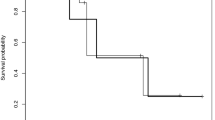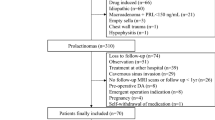Abstract
Objective
The aim of the study was to explore the bone morphogenetic protein 4 (BMP-4) how to regulate prolactin (PRL) secreting, cell proliferation and invasiveness in human prolactinoma.
Methods
Ten patients who diagnosed as prolactinoma by clinical characteristics and pathology were divided into two groups, one was sensitive to Bromocriptine, the other was insensitive to Bromocriptine. Every case was conducted by primal cell culture then treated by different concentrations of BMP-4. The cell configuration was observed and PRL hormone was measured in different times. The expressions of BMP-4 mRNA and BMP-4 in 37 cases of prolactinoma and 8 cases of normal pituitary tissues samples were detected by immunohistochemical and in situ hybridization technique, and the results were analyzed by statistic methods.
Results
BMP-4 (5 ng/mL) could accelerate the secreting of PRL in prolactinoma cell, and it could reach the greatest effect in the concentration of 20 ng/mL. BMP-4 could increase prolactinoma cell proliferation, but when the concentration was 50 ng/mL, the BMP-4 effect of increasing secreting decreased. When 100 ng/mL, the cell began to die. The effects of the BMP-4 in sensitive group and insensitive group had no difference. The BMP-4 was highly expressed in the prolactinomas and was positively related with the invasiveness grades.
Conclusion
BMP-4 have positive regulation in prolactinoma secreting, proliferation, invasiveness effects. BMP-4 probably has the important role in prolactinoma pathogenesis.
Similar content being viewed by others
References
Kiyozuka Y, Nakagawa H, Senzaki H, et al. Bone morphogenetic protein-2 and type IV collagen expression in psammoma body forming ovarian cancer. Anticancer Res, 2001, 21: 1723–1730.
Paez-Pereda M, Giacomini D, Refojo D, et al. Involvement of bone morphogenetic protein 4 (BMP-4) in pituitary prolactinoma pathogenesis through a Smad/estrogen receptor crosstalk. Proc Natl Acad Sci USA, 2003, 100: 1034–1039.
Adams EF, Brajkovich IE, Mashiter K. Hormone secretion by dispersed cell cultures of human pituitary adenomas: effects of theophylline, thyrotropin-releasing hormone, somatostatin, and 2-bromo-α-ergocryptine. J Clin Endocrinol Metab, 1979, 49: 120–126.
Wang CJ, Howng SL. Human prolactinomas in cell culture: structurefunction correlation and indication of early relapse. Kaohsiung J Med Sci, 1996, 12: 394–399.
Mehler MF, Mabie PC, Zhu G, et al. Developmental changes in progenitor cell responsiveness to bone morphogenetic proteins differentially modulate progressive CNS lineage fate. Dev Neurosci, 2000, 22: 74–85.
Giacomini D, Páez-Pereda M, Refojo D, et al. New mechanisms involved in the pathogenesis of pituitary adenomas. Medicina (B Aires), 2003, 63: 147–150.
Author information
Authors and Affiliations
Corresponding author
Rights and permissions
About this article
Cite this article
Wang, X., Chen, J., Zeng, H. et al. BMP-4 accelerates PRL secreting, cell proliferation and invasiveness in human prolactinoma. Chin. -Ger. J. Clin. Oncol. 9, 109–112 (2010). https://doi.org/10.1007/s10330-009-0170-z
Received:
Revised:
Accepted:
Published:
Issue Date:
DOI: https://doi.org/10.1007/s10330-009-0170-z




